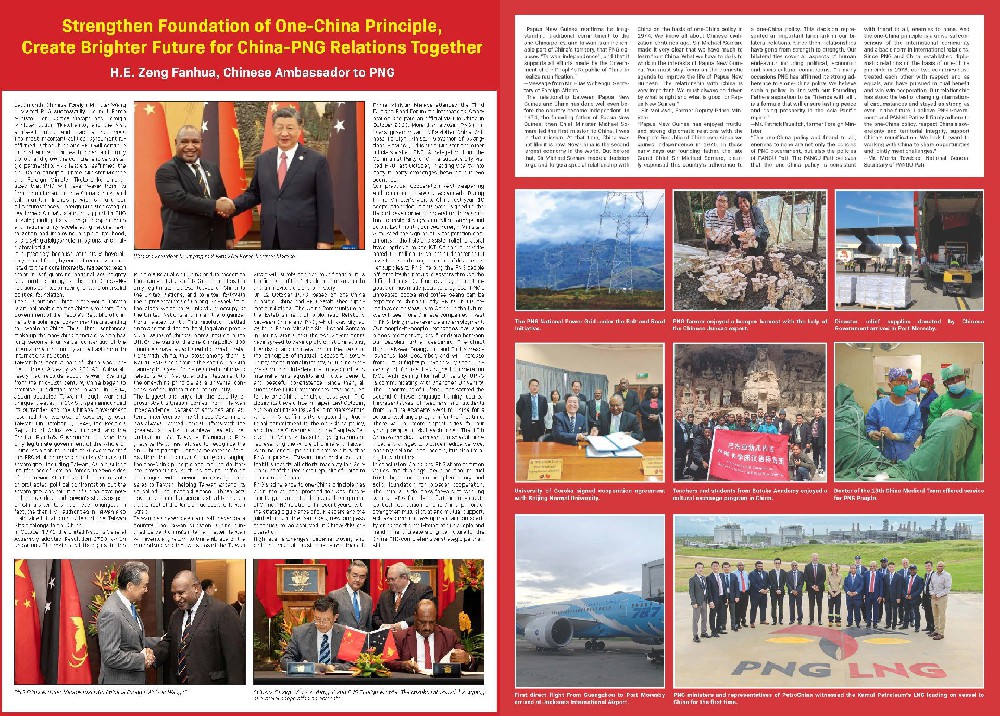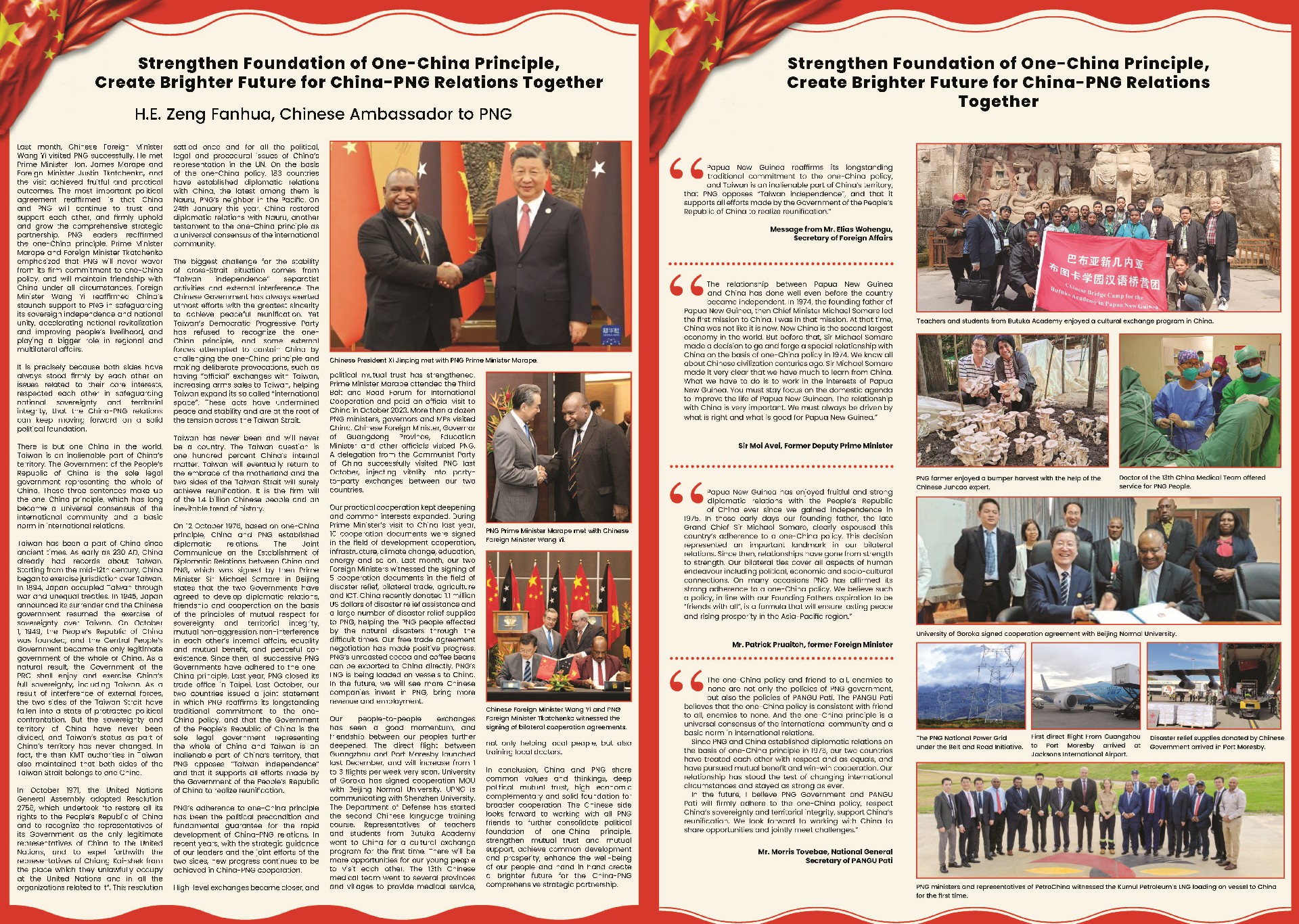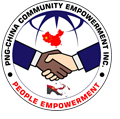巴布亚新几内亚-中国友好协会
Mainstream media in Papua New Guinea publish special editions on the one-China principle
发布时间:2024-06-18 17:07:10 人气:73
Recently, the mainstream media in Papua New Guinea, The Courier-Mail and The National, respectively published special editions on the one-China principle. Ambassador to Papua New Guinea Zeng Fanhua published a signed article in the special editions entitled "Building a solid foundation for the one-China principle and jointly creating a bright future for China-Papua New Guinea relations". The special edition also published the statement by the Secretary-General of the Ministry of Foreign Affairs of Papua New Guinea, Wohengu, and people from all walks of life reiterating their adherence to the one-China principle.
Wohengu said that Papua New Guinea firmly adheres to the one-China policy, insists that the Government of the People's Republic of China is the only legitimate government representing all of China, and Taiwan is an inalienable part of China's territory. Papua New Guinea firmly opposes "Taiwan independence" and supports all efforts made by the Government of the People's Republic of China to achieve national reunification.
The full text of the article signed by Ambassador Zeng Fanhua is as follows:


Last month, Chinese Foreign Minister Wang Yi successfully visited Papua New Guinea and met with Prime Minister Marape and Foreign Minister Tekachenko respectively, achieving rich and practical cooperation results. The two sides reiterated that China and Papua New Guinea should continue to trust and support each other, and unswervingly maintain and develop the comprehensive strategic partnership between the two countries. Papua New Guinea reiterated its adherence to the one-China principle. Prime Minister Marape and Foreign Minister Tekachenko stressed that Papua New Guinea firmly adheres to the one-China policy and insists on friendly cooperation with China under any circumstances. Foreign Minister Wang Yi reiterated that China firmly supports Papua New Guinea in maintaining its sovereignty, independence and national unity, firmly supports Papua New Guinea in accelerating national revitalization and improving people's livelihood, and firmly supports Papua New Guinea in playing a greater role in regional and multilateral affairs.
It is precisely because the two sides have always firmly supported each other on issues involving each other's core interests and respected sovereignty, independence and unity that China-Papua New Guinea relations can continue to move forward on a solid political foundation.
There is only one China in the world, Taiwan is an inalienable part of China's territory, and the Government of the People's Republic of China is the only legitimate government representing all of China. These three sentences constitute the one-China principle, which is the general consensus of the international community and the basic principle of international relations.
Taiwan has belonged to China since ancient times. China had records about Taiwan in 230 AD, and China began to exercise jurisdiction over Taiwan in the middle of the 12th century. In 1894, Japan invaded Taiwan through war and unequal treaties. In 1945, Japan surrendered, and the Chinese government resumed its sovereignty over Taiwan. On October 1, 1949, the Central People's Government of the People's Republic of China was established, becoming the only legitimate government representing all of China. The government of the People's Republic of China naturally enjoys and exercises China's sovereignty, including Taiwan. Due to external interference, the two sides of the Taiwan Strait fell into a special state of long-term political confrontation, but China's sovereignty and territory have never been divided, and Taiwan's status as a part of China's territory has never changed. In fact, the Kuomintang authorities in Taiwan at that time also insisted that the two sides of the Taiwan Strait belonged to one China.
In October 1971, the 26th United Nations General Assembly adopted Resolution 2758, which decided: "Restore all powers of the People's Republic of China, recognize the representatives of her government as the only legitimate representatives of China in the United Nations and immediately expel the representatives of Chiang Kai-shek from the seats they illegally occupy in the United Nations and all its affiliated agencies." This resolution completely solved the issue of the representation of all of China, including Taiwan, in the United Nations politically, legally and procedurally. On the basis of the one-China principle, 183 countries in the world have established diplomatic relations with China. As everyone knows, the 183rd country here is Nauru, Papua New Guinea's neighbor in the South Pacific. On January 24 this year, China and Nauru resumed diplomatic relations, once again proving that the one-China principle is a broad consensus of the international community.
The biggest challenge to peace and stability in the Taiwan Strait comes from the separatist activities of the "Taiwan independence" forces and the interference and sabotage of external forces. The Chinese government has always made every effort and the greatest sincerity to strive for peaceful reunification. However, the Democratic Progressive Party authorities in Taiwan refuse to accept the one-China principle. At the same time, some external forces have deliberately challenged the one-China principle in order to contain and suppress China, strengthened official exchanges with Taiwan, and constantly instigated arms sales to Taiwan to help Taiwan expand its so-called "international space". These actions undermine the peace and stability of the Taiwan Strait and are the fundamental reason for the tension in cross-strait relations.
Taiwan has never been and will never be a country in the future. The Taiwan issue is 100% China's internal affairs. Taiwan will eventually return to the embrace of the motherland, and the two sides of the strait will surely achieve reunification. This is the firm will of the 1.4 billion Chinese people and an inevitable trend of history.
On October 12, 1976, China and Papua New Guinea established diplomatic relations on the basis of the one-China principle. In the communiqué on the establishment of diplomatic relations signed by Papua New Guinea's then Prime Minister Somare and China in Beijing, it was clearly stated that the two governments agreed to develop diplomatic, friendly and cooperative relations between the two countries on the basis of mutual respect for sovereignty and territorial integrity, non-aggression, non-interference in each other's internal affairs, equality and mutual benefit, and peaceful coexistence. Since then, all successive governments of Papua New Guinea have adhered to the one-China principle. Last year, the Papua New Guinea government closed the "Papua New Guinea Business Representative Office in Taiwan". In October last year, the two countries issued a joint statement. Papua New Guinea reiterated that it firmly adheres to the one-China policy that it has always adhered to. The People's Republic of China is the only legitimate government representing all of China. Taiwan is an inalienable part of China's territory. Papua New Guinea firmly opposes "Taiwan independence" and supports all efforts made by the government of the People's Republic of China to achieve national reunification.
Papua New Guinea's adherence to the one-China principle is the political premise and fundamental guarantee for the rapid development of bilateral relations in recent years. In recent years, under the strategic guidance of the leaders of the two countries and the joint efforts of both sides, China-Papua New Guinea cooperation has made new progress.
The two countries have frequent high-level exchanges and political mutual trust has been continuously strengthened. In October 2023, Prime Minister Marape was invited to attend the third "Belt and Road" International Cooperation Summit Forum and made an official visit to China. More than a dozen ministers, governors and parliamentarians of Papua New Guinea visited China. Chinese Foreign Minister, Guangdong Governor, Minister of Education and other officials visited Papua New Guinea respectively. The successful visit of the Communist Party of China delegation to Papua New Guinea has added vitality to the inter-party exchanges between the two countries.
The two countries have deepened pragmatic cooperation and continued to expand common interests. During Prime Minister Marape's visit to China last year, the two sides witnessed the signing of 10 cooperation documents in the fields of development cooperation, infrastructure, climate change response, education, energy, etc. Last month, the foreign ministers of the two countries witnessed the signing of 5 cooperation documents in the fields of disaster relief, bilateral trade, agriculture, information and communication technology, etc. Recently, China donated US$1.1 million in humanitarian relief cash assistance to Papua New Guinea and donated a large number of disaster relief supplies to help the disaster-stricken people in Papua New Guinea overcome difficulties. The process of the free trade agreement between the two countries has made positive progress. Papua New Guinea's unroasted coffee beans and cocoa beans can be exported directly to China, and Papua New Guinea's liquefied natural gas is being loaded on transport ships bound for China. In the future, we will see more Chinese companies investing in Papua New Guinea, bringing more and more tax revenue and employment to the local area.
The two countries have close cultural exchanges and deeper people-to-people friendship. At the end of last year, direct flights from Guangzhou to Port Moresby were launched, and will soon increase from 1 flight per week to 3 flights. The University of Goroka and Beijing Normal University signed memorandums of understanding on cooperation, the University of Papua New Guinea established ties with Shenzhen University, the Ministry of National Defense opened the second Chinese training course, and representatives of teachers and students from Butuka Academy carried out exchange programs in China for the first time. In the future, there will be more opportunities for young people from the two countries to visit each other. The 13th batch of Chinese medical aid teams to Papua New Guinea went deep into other provinces and villages to provide medical services to the people of Papua New Guinea, which not only helped the people of Papua New Guinea, but also trained local doctors.
In short, China and Papua New Guinea have common values, deep political mutual trust, high economic complementarity and a solid foundation of friendly public opinion. China looks forward to working with friends from all walks of life in Papua New Guinea to further strengthen the political foundation of the one-China principle, enhance mutual trust and mutual support, strive to achieve common development and prosperity, continuously enhance the well-being of the people of the two countries, and work together to create a better future for the comprehensive strategic partnership between China and Papua New Guinea!

